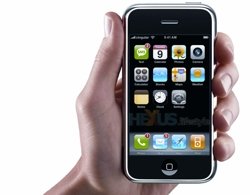
- Image via CrunchBase
IAN LYNCH SMITH, a shaggy-haired ball of energy in his late 30s, beams as he ticks off some of the games that Freeverse, his little Brooklyn software company, has landed on the iPhone App Store’s coveted (and ever-changing) list of best-selling downloads: Moto Chaser, Flick Fishing, Flick Bowling and Skee-ball.
Skee-ball, Mr. Smith says, took about two months to develop and deploy and then raked in $181,000 for Freeverse in one month. The company’s latest bid for App Store fame? A game featuring a Jane Austen character in a lacy dress who karate-chops her way through hordes of advancing zombies.
“There’s never been anything like this experience for mobile software,” Mr. Smith says of the App Store boom. “This is the future of digital distribution for everything: software, games, entertainment, all kinds of content.”
As the App Store evolves from a kitschy catalog of novelty applications into what analysts and aficionados describe as a platform that is rapidly transforming mobile computing and telephony, it is changing the goals and testing the patience of developers, bolstering sales of the Apple motherships the applications ride upon — the iPhone and iPod Touch — and causing Apple’s competitors to overhaul their product lines and business models. It even threatens to open chinks in Apple’s own corporate armor.
Thanks in large part to the iPhone, introduced in 2007, and the App Store, which opened its doors last year, smartphones have become the Swiss Army knives of the digital age.
They provide a staggering arsenal of functions and tools at the swipe of a finger: e-mail and text messaging, video and photography, maps and turn-by-turn navigation, media and books, music and games, mobile shopping, and even wireless keys that remotely unlock cars.
“Apple changed the view of what you can do with that small phone in your back pocket,” says Katy Huberty, a Morgan Stanley analyst. “Applications make the smartphone trend a revolutionary trend — one we haven’t seen in consumer technology for many years.”
Ms. Huberty likens the advent of the App Store and the iPhone to AOL’s pioneering role in driving broad-based consumer adoption of the Internet in the 1990s. She also draws comparisons to ways in which laptops have upended industry assumptions about consumer preferences and desktop computing. But, she notes, something even more profound may now be afoot.
“The iPhone is something different. It’s changing our behavior,” she says. “The game that Apple is playing is to become the Microsoft of the smartphone market.”
Related articles by Zemanta
- Apple’s Reported Lala Talks Could Lead to Cheaper, Cloud-Based iTunes (wired.com)
- RedEye Brings Multi-Touch to Your TV, Turns your iPhone and iPod Touch into a Universal Remote Control (techstartups.com)
- Analyst: App Store Could Hit 300,000 Apps Next Year (mashable.com)
- Analysts Predict 1 Billion+ Mobile Web Users by 2010 (readwriteweb.com)
- Write Text on your iPhone with Your Finger: Dan Bricklin’s NoteTaker (offonatangent.blogspot.com)
- For the iPhone’s App Store, Quantity Really Does Matter (wired.com)
![Reblog this post [with Zemanta]](http://img.zemanta.com/reblog_b.png?x-id=9ff4d99a-586f-4f8a-8c7c-b9134c08e513)







